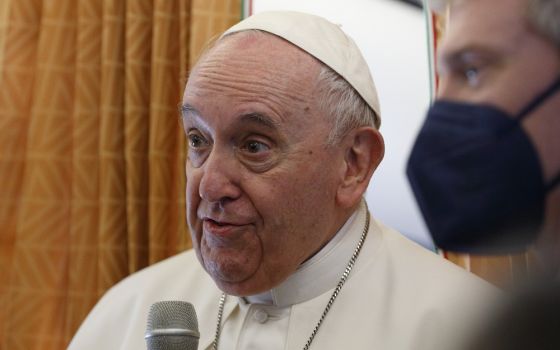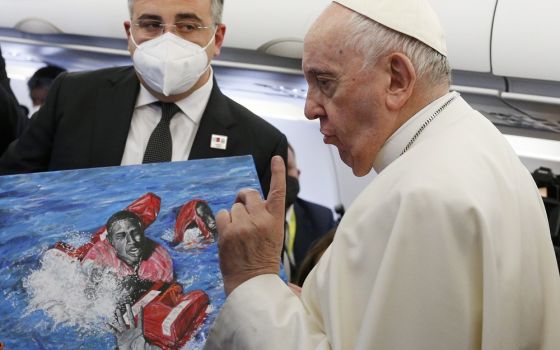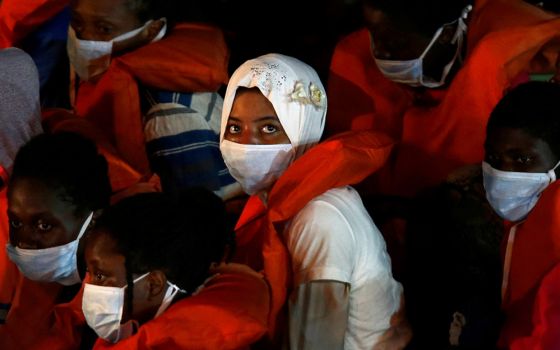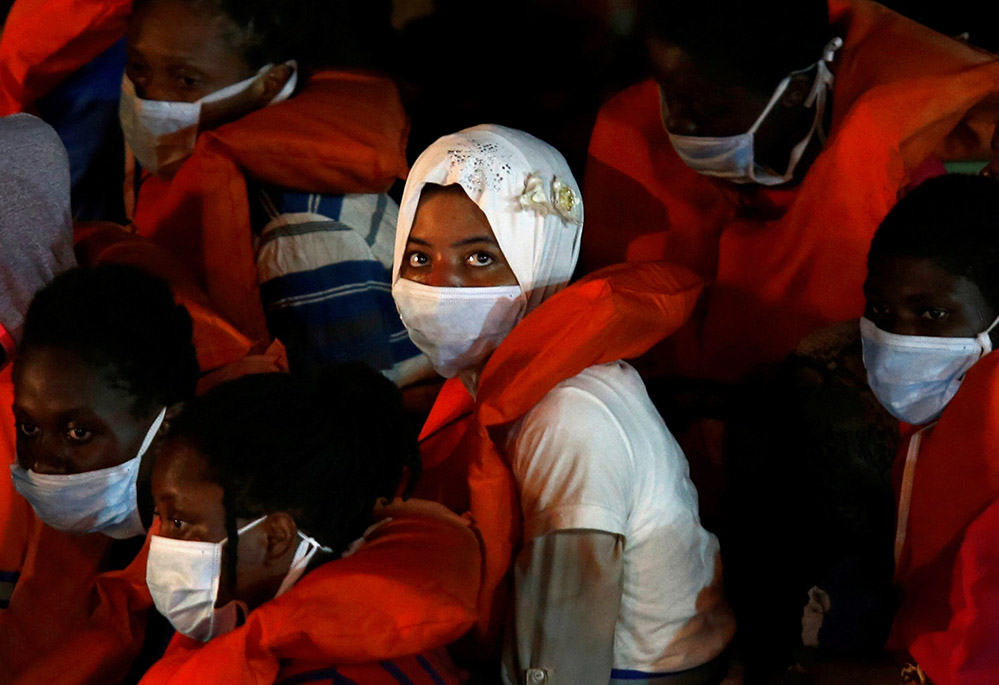
Rescued migrants look out from an Armed Forces of Malta vessel upon their arrival in Valletta, Malta, Aug. 3, 2020. Given the country's close proximity to North Africa and the Middle East, several thousands of migrants a year are rescued at sea and eventually disembark in Malta. (CNS/Reuters/Darrin Zammit Lupi)
When the Apostle Paul was shipwrecked on Malta during the first century, he was, according to the Scriptures, welcomed with "extraordinary hospitality."
Nearly 2,000 years later, as Pope Francis prepares to travel to the Mediterranean island nation for his April 2-3 visit, there is hope that the same spirit of welcome to new arrivals will reinvigorate the local church, as migration is set to be a major issue on yet another of Francis' trips abroad.
"We are greeting the pope as a herald of mercy," Malta Archbishop Charles Scicluna told NCR, "and the act of mercy takes on different forms. In our Mediterranean context, there is a work of mercy that is offering safe haven for migrants and foreigners."
"'I was a foreigner and you greeted me and you welcomed me,'" Scicluna continued, paraphrasing the Gospel command. "That's a work of mercy that is commanded by the Lord in Matthew 25. And that is something that is vital to the continued mission of the church."
When Francis arrives in the Maltese capital of Valletta on Saturday, April 2, it will be nearly two years after he had first planned to travel there in May 2020, before the trip was eventually canceled due to the COVID-19 pandemic.
Now, Francis is set to embark on his fourth trip outside of Italy since the pandemic first began — and his 36th since his 2013 election as a pope — and once again, he has chosen a tiny island to reiterate one of the big themes of his papacy: welcoming migrants is a way to welcome Christ.
Advertisement
Although Francis has emerged as one of the world's leading champions for migrants, that advocacy has often encountered fierce opposition, especially from small European countries that have felt overwhelmed by new arrivals from North Africa and the Middle East.
Given Malta's close proximity to both regions, several thousands of migrants a year are rescued at sea and eventually disembark in Malta. A vast number of those rely on the Catholic Church's institutions as they navigate their new lives.
"We are an important stepping stone of people wanting to move north to Europe," said Scicluna, who noted that the physical location of the island means there is "great responsibility and great burden" to bear at the same time.
In addition to combating racism and isolationist sentiments, another component of the challenge of migration in Malta stems from a European Union rule (known as the "Dublin Regulation") requiring new arrivals to seek asylum in the first country in Europe in which they arrive, creating a disproportionate responsibility for the small nation of just over 500,000 residents.
Scicluna said that the deeply Catholic nation must have a posture of welcome and a readiness to assist migrants and refugees, while at the same time advocating for greater flexibility of the European Union's rule to easier manage the distribution of new arrivals.
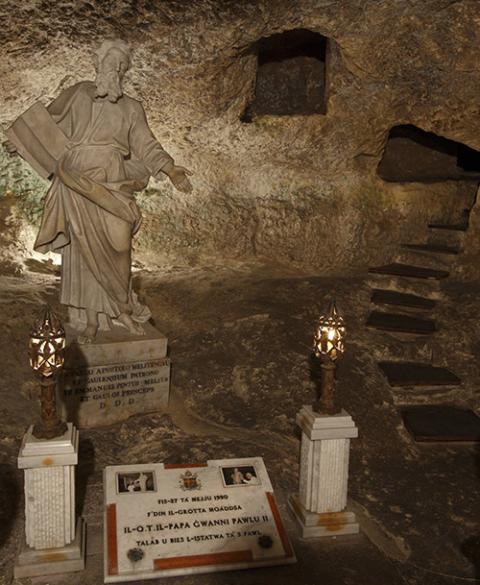
A statue of St. Paul is seen in the grotto dedicated to him in Rabat, Malta. According to tradition, St. Paul chose to live here during the three months he and his companions were shipwrecked on the island. (CNS/Paul Haring)
Following the pope's morning arrival on April 2, Francis will meet with civil authorities at the presidential palace where the pope, the president and prime minister are all expected to address the topic head on. Francis will then travel by boat to the northern island of Gozo for a prayer service at the Basilica of the National Shrine of the Blessed Virgin of Ta' Pinu.
On Sunday, April 3, Francis will visit the grotto of St. Paul in Rabat, followed by a Mass and an afternoon meeting with an estimated 200 migrants before flying back to Rome in the early evening.
The less than 48-hour trip is expected to test the stamina of the 85-year-old Francis who has been experiencing difficulties walking due to severe knee pain, but Fr. Stefan Attard, dean of the theology department at University of Malta, says the visit could not come at a more needed time for the country.
"For many decades, the church was at the center of society," said Attard, who observed that in the past 20 years church attendance has declined and many Maltese have increasingly distanced themselves from the church.
Yet Attard does not despair, recalling something Scicluna once said in describing the situation: "A light doesn't have to be in the middle of the room to illuminate it."
"We don't have to be at the center of society to shine a light on it," Attard told NCR.
In the last decade, Malta has legalized divorce and gay marriage, the country's strict abortion ban is up for debate, and the country just underwent a bruising national election less than a week ago in which government corruption was a defining issue.
The role of the church, Attard believes, is not to tell Maltese society what to do or how to vote — or to take a confrontational stance toward those estranged from the church — but instead to seek ways "to be more welcoming and how to build bridges."
For that reason, the island's Catholic community is in the middle of a five-year process known as the "One Church, One Journey" campaign, with an aim of becoming a better listening and more welcoming church.
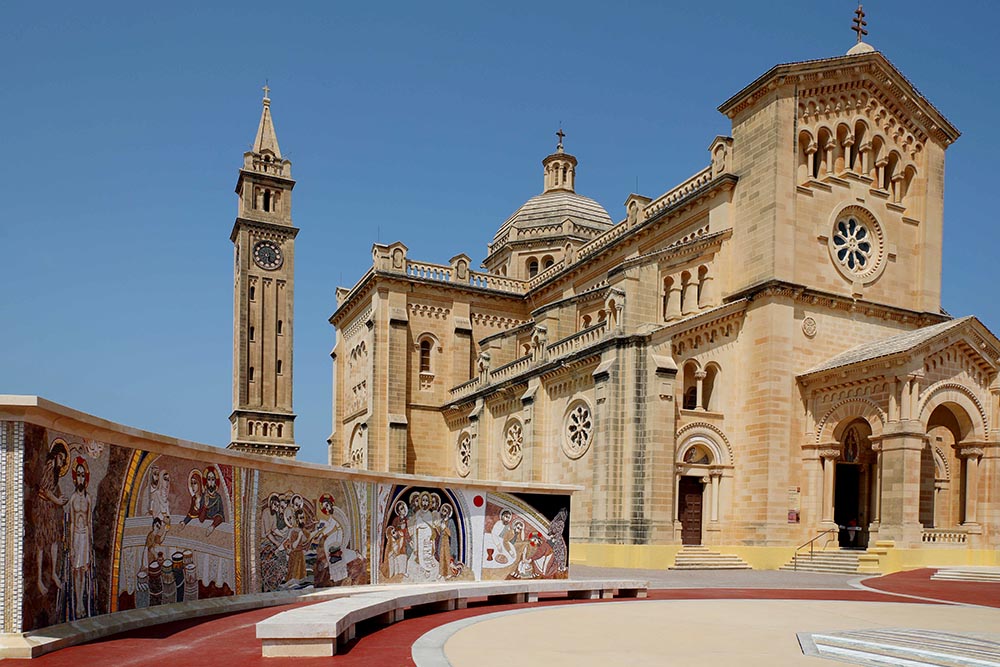
The Basilica of the National Shrine of the Blessed Virgin of Ta' Pinu on the northern Malta island of Gozo (Wikimedia Commons/Briancassar)
Francis' two-day visit to the island will serve as a booster shot to that process, said Attard, who believes that the synodally inspired initiative will help the church improve its LGBTQ outreach, listen to clergy sex abuse victims, increase vocations to the priesthood, address climate change and, of course, welcome migrants.
"This is what the pope is encouraging us to do," he said. "It's not so much all about teaching and preaching, but I think the church is trying to be more physical — being close to people, walking with them and sustaining them and their needs and focusing on an ongoing conversion."
Scicluna said he believes that Francis' papal visit, like similar journeys to the island by Popes John Paul II and Benedict XVI, will "provide a word of comfort, a word of mercy and also an invitation to go back to our roots" to address the concern of what it means to be a Christian in today's world.
"We are all very proud of the beautiful narrative of Acts," he said, recalling the passage where the Maltese are praised for welcoming St. Paul and 274 other passengers in need of support.
"This is something we need to rediscover in our relationships between one another in our society," he said. "We can be a divided society when it comes to so many issues."
And for that reason, Scicluna said he thinks the papal trip's purpose is clear: "To go beyond the usual tribal attitudes and move us toward the common good."





